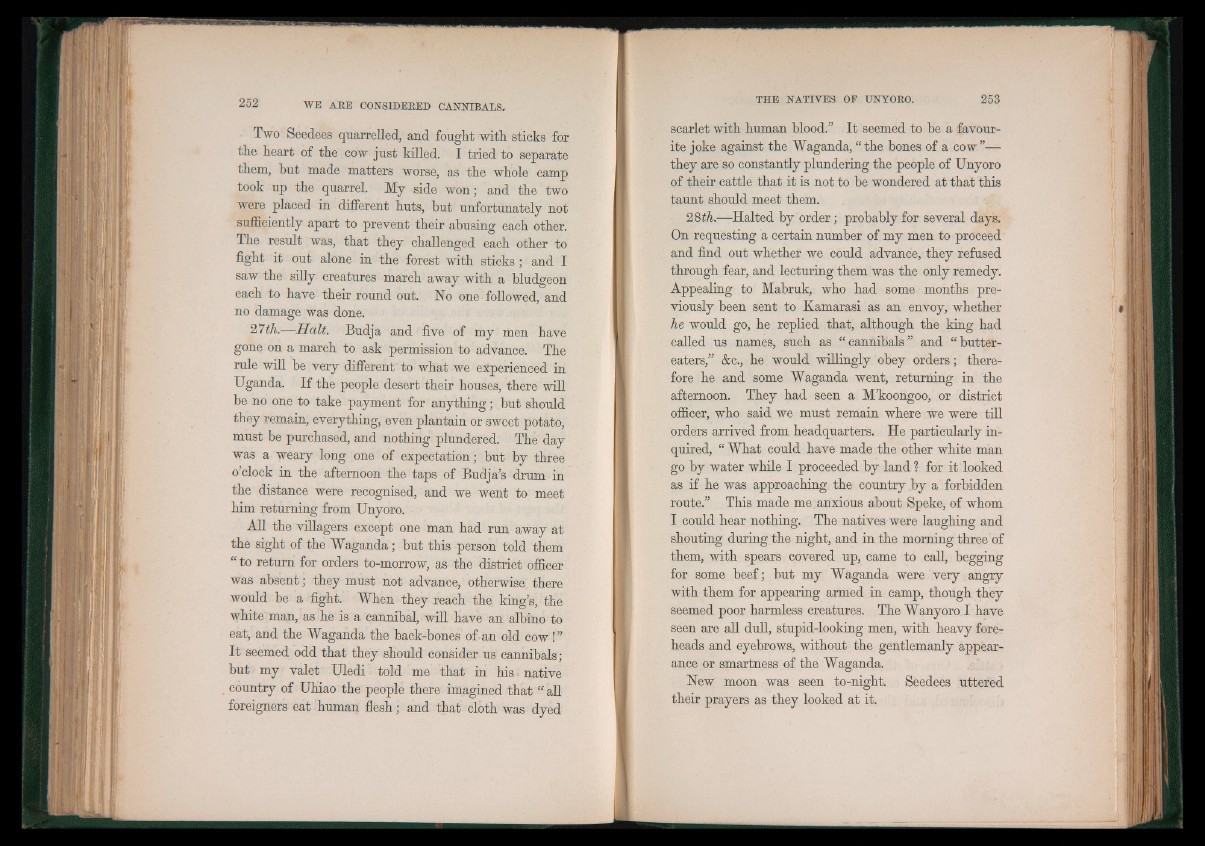
Two Seedees quarrelled, and fought with sticks for
the heart of the cow just killed. I tried to separate
them, hut made matters worse, as the whole camp
took up the quarrel. My side won; and the two
were placed in different huts, but unfortunately not
sufficiently apart to prevent their abusing each other.
The result was, that they challenged each other to
fight it out alone in the forest with sticks;■ and I
saw the silly creatures march away with a bludgeon
each to have their round out. No one followed, and
no damage was done.
2 *7th.—Halt. Budja and five of my men have
gone on a march to ask permission to advance. The
rule will be very different' to what we experienced in
Uganda. If the people desert their houses, there will
be no one to take payment for anything; but should
they remain, everything, even plantain or sweet potato,
must be purchased, and nothing plundered. The day
was a weary long one of expectation; but by three
o’clock in the afternoon the taps of Budja’s drum in
the distance were recognised, and we went to meet
him returning from Unyoro.
All the villagers except one man had run away at
the sight of the Waganda; but this person told them
“ to return for orders to-morrow, as the district officer
was absent; they must not advance, otherwise there
would be a fight. When they reach the king’s, the
white man, as he is a cannibal, will have an albino to
eat, and the Waganda the back-bones of an old cow !”
It seemed odd that they should consider us cannibals;
but my valet Uledi told me that in his . native
country of Uhiao the people there imagined that “ all
foreigners eat human flesh; and that cloth was dyed
scarlet with human blood.” It seemed to be a favourite
joke against the Waganda, “ the bones of a cow”—
they are so constantly plundering the people of Unyoro
of their cattle that it is not to be wondered at that this
taunt should meet them.
28 th.—Halted by order; probably for several days.
On requesting a certain number of my men to proceed
and find out whether we could advance, they refused
through fear, and lecturing them was the only remedy.
Appealing to Mabruk, who had some months previously
been sent to Kamarasi as an envoy, whether
he would go, he replied that, although the king had
called us names, such as “ cannibals” and “ butter-
eaters,” &c., he would willingly obey orders; therefore
he and some Waganda went, returning in the
afternoon. They had seen a M’koongoo, or district
officer, who said, we must remain where we were till
orders arrived from headquarters. He particularly inquired,
“ What could have made the other white man
go by water while I proceeded by land ? for it looked
as if he was approaching the country by a forbidden
route.” This made me anxious about Speke, of whom
I could hear nothing. The natives were laughing and
shouting during the night, and in the morning three of
them, with spears covered up, came to call, begging
for some beef; but my Waganda were very an g ry
with them for appearing armed in camp, though they
seemed poor harmless creatures. The Wanyoro I have
seen are all dull, stupid-looking men, with heavy foreheads
and eyebrows, without the gentlemanly appearance
or smartness of the Waganda.
New moon was seen to-night. Seedees uttered
their prayers as they looked at it.